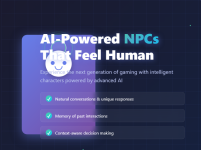syed Tehzeeb
New member
- Joined
- Sep 12, 2025
- Messages
- 10
- Thread Author
- #1
Remember when game characters used to repeat the same three lines over and over? Those days are fading fast. We're entering an era where non-playable characters (NPCs) can hold genuine conversations, remember your past interactions, and react to situations in ways that feel surprisingly human.
What makes this possible? Small, specialized language models that run efficiently without requiring massive computing power. Developers are training these models on specific character backgrounds, game lore, and personality traits. The result is an NPC shopkeeper who might remember you saved their village, or a quest giver who adapts their dialogue based on your previous choices.

The technology also solves a major problem in open-world games: repetitive interactions. No more guards saying "I used to be an adventurer like you" for the thousandth time. Each conversation can feel fresh and contextually appropriate.
The question isn't whether AI-powered NPCs will become standard—it's how quickly developers can refine the technology to create truly unforgettable gaming experiences. The future of interactive storytelling is here, and it's more human than ever.
The Technology Behind Intelligent NPCs
Modern games are integrating large language models—the same technology powering chatbots like ChatGPT—directly into character interactions. Instead of following rigid scripts, these AI-powered NPCs can understand context, generate unique responses, and even develop distinct personalities. Games like the latest Call of Duty and Assassin's Creed titles are already experimenting with this technology, creating characters that feel less like robots and more like actual people.What makes this possible? Small, specialized language models that run efficiently without requiring massive computing power. Developers are training these models on specific character backgrounds, game lore, and personality traits. The result is an NPC shopkeeper who might remember you saved their village, or a quest giver who adapts their dialogue based on your previous choices.

Why This Changes Everything
Think about your favorite RPG. How often have you wished you could ask that mysterious character just one more question? With AI-powered NPCs, you can. These characters can handle unexpected questions, provide hints without breaking immersion, and create organic storytelling moments that traditional programming simply couldn't achieve.The technology also solves a major problem in open-world games: repetitive interactions. No more guards saying "I used to be an adventurer like you" for the thousandth time. Each conversation can feel fresh and contextually appropriate.
The Challenges Ahead
Of course, this technology isn't perfect yet. Developers need to balance creative freedom with maintaining story consistency. There's also the risk of AI-generated dialogue breaking game immersion if it becomes too unpredictable or contradicts established lore. Plus, implementing these systems requires significant development resources.What's Next for Gamers
As this technology matures, we'll see games where every character feels alive and reactive. Imagine playing a detective game where witnesses actually remember details differently, or a strategy game where your advisors debate decisions based on their unique perspectives.The question isn't whether AI-powered NPCs will become standard—it's how quickly developers can refine the technology to create truly unforgettable gaming experiences. The future of interactive storytelling is here, and it's more human than ever.